Hi Tumblr I Love The Dreemurrs 🌼

hi tumblr I love the dreemurrs 🌼
More Posts from Shiroace and Others
This is so fucking cool

Doing Sisko in the style of an Eastern Orthodox Icon painting because recent events have got me thinking about that type of thing
Details under the cut


my refrigerator w legs barrels towards me and grabs me and stuffs me into its vegetable drawer then casually walks away
It is logical to serve looks: traditional Vulcan clothing.
Traditional Vulcan clothing normally consists of several layers of robes in contrasting earth and jewel tones. Sashes are often worn with robes, but are not commonly worn with shorter shirts. The materials used are mostly natural, like tugno’t or sha'amii wool. Dr'thelek silk, which is not produced or sold outside Vulcan, is traditional for formal gear; however, younger Vulcans favour lighter materials, like Tholian silk. Clothing is cut pretty much the same for men and women, and gender is not typically indicated by style.
Did you know there are actually many words in the Vulcan language to designate specific styles of robes? I have compiled a vocabulary list with some traditional Vulcan clothing items that don’t quite translate with the same degree of precision into English:
ROBES AND SASHES
Beyip: a light robe, often worn under other robes, or over a ne’ahn. The front wraps left over right and is attached on the right side with knotted buttons or with electrostatic seams. Worn as casual wear for business or other activities. May be worn with a casual sash or a mos’opelal if necessary for warmth.
Mos’opelal: A “soft” or light version of the more formal opelal, worn on less-formal occasions.
Si’pelal: an outer, sleeved robe, usually of heavier and elegant fabric, worn over the beyip and under the opelal in more formal ocassions, and always worn with a sash.
Opelal: a heavy “honorable robe” (formal robe), often with broad shoulders, loose sleeves, and a wide hood, worn open at the front to show a contrasting si’pelal. Often, “Rata Tafar Tapan” is embroidered on the right lapel of this garment, specially if the wearer has completed Kolinahr.
Osan-wun: Formal sash, typically consisting of two or three bands, each a bit wider than a typical sash. The ends of a sash can normally be worn long, sometimes nearly to the ground, but in formal occassions that call for the use of an osan-wun, stylized knots are used to keep the ends closed and flat against the sash.

Pel-ahn: A light ankle-length garment, typically with long sleeves and often worn as casual everyday dress. It also crosses left over right and fastens at the right shoulder. Typically not worn with a sash. It is looser and more utilitarian than a beyip. A version that extends only to the hips and is worn with trousers also exists and is called a sav-ahn.

Pel-pen: Medium-length robe, wrapped left to right and fastened on the right side with several buttons. Typically knee-length with wide half- or ¾-sleeves and belted about the waist with a sash or belt. Can be worn with trousers or not.
M’ai-wem: a long-sleeved, floor-length dress, often worn with a light opelal. Similar to a pel-ahn, but more close-fitting.
Pi’to-sai: Small cloak. A light cross between a robe and a cloak, typically worn over a beyip, pel-ahn or m’ai-wem.

Salan-sai: A “cloak of breezes.” A sheer, draped, sleeveless garment, open or lightly fastened at the front, worn casually around the house on hotter days. Often brightly-colored and patterned. More formal versions are normally white and worn for ritual functions by lesser celebrants and called y’osalan-sai.

To-pen: A short cape, normally with a hood and wide lapels which extend below the lower edge in front.

To-sai: A cloak, typically calf- or floor-length, with a hood and openings at the sides to allow the arms to pass through. Similar to an opeleal, but more casual and seldom made of costly fabric.

Tipan-dosh: A ritual vestment, consisting of a strip of heavy fabric, shoulder-width or slightly broader, with a hole in the middle for the head. Some come to a point. A tipan-dosh is worn over the y’osi’pelal.

Ak’shem-ai: a traditional bodysuit. Can be worn by itself or under a y’osalan-sai.

Tipan-zhvi: A ritual vestment rather like a rationale, worn across the shoulders and draped down the front and back. Often with cut-outs to reveal the y’osi’pelal (ritual si’pelal) beneath.

To-pal-el: A light jacket of hip- or thigh-length, open at the front and not typically worn closed. Usually has a high collar. A generally utilitarian piece of clothing worn for everyday use. A similar garnment is the pel-pen-zh’e, which does fasten (usually in the middle), is often sleeveless, and it’s cut on the sides to show the trousers worn beneath.
Abru’sav-el: a shirt which is drawn on over the head and has no seams or fastenings. Typically has long sleeves, but versions with short sleeves do exist.
Pel-el: A shirt that wraps across the front, left over right, like a robe, and typically covers the tops of the thighs. It is worn with trousers and occassionally a mos-opelal and/or a light sash as casual “business-wear.”

Pi’mal-kan: A child’s short pants, similar to briefs. Sometimes worn with a pi’san (child’s sash), worn as a baldric across the chest, and carrying family and school markings (shasu’buhk).

ACCESSORIES
Kuvor-talk: a simple closed cap that covers the back of the head, with cheek pieces cut high to expose and highlight the ears.
Ozhup’ai: ceremonial crown worn by officials for highly-formal events
Patam-puna-ti: a type of shawl covering the head and shoulders, typically worn close to the hair.

Patam-wun: a cloth wrapped around the forehead, typically bound at the back with an elaborate knot.
Patem-sai: a type of traditional hat worn throughout vulcan society, though its use is waning outside of ceremonial occasions.

Tark-oyel: “Star coronet”. Worn at many ceremonial events, the the two horn-like shapes represent the red and the white stars visible in the Vulcan sky.

Y’svit azh’wein: a ritual mask that covers the nose and mouth, used only during ceremonies by certain celebrants, such as honor guards. It is derived from an ancient desert mask designed to protect the nose and mouth from dust.

Zhup’ai: a type of hat worn for formal events or as a craftsman’s traditional clothing.

Ut’talu: Interestingly, Vulcan has two words for “necklace”. An ut'talu is solid and torque-like, as opposed to a vik'talu, which is a pendant hanging on a chain or cord. By the way, the most widely used stone in Vulcan jewelry is rubinite, as it’s very common in Vulcan.

UNDERWEAR
Ash’ai-kuv: a kind of garter typically worn above the knee, usually with some form of ritual symbol or markings. Worn under the clothing by religiously-minded Vulcans.
Ash-wu: a high sock or stocking that typically covers up to the upper thigh. These are worn almost entirely for formal and ceremonial occassions.
Ne’ahn: under robe, often with ¾ sleeves, white or pale-toned and ankle-length. Often has a high collar which can be seen above the collar of a beyip or pel-ahn.
Ne’ak’shem: a type of short bodysuit or leotard used as underwear. It is elastic, close-fitting and has no fastenings. Some Vulcans prefer it instead of Terran-style underwear.
Pi’toh: a type of loincloth consisting of rectangular panels and a cord to tie it in place. It has currently fallen out of fashion and is only worn for certain ceremonial purposes or by very traditional Vulcans, but it appears often in depictions of pre-Surakian times.
Sources: VLD, VLRP, Hidden Universe Travel Guides: Star Trek: Vulcan, Christies, Purple Sloth, ENT, TAS, ST: TMP, ST: Beyond, ST: SFS, ST: FC, STO.
me when tracy 😦
AWWWW I LOVE THE IDEA OF CHAIRIEL BECOMING A DARK WORLDER (imagine Kris having to carry an entire chair into the school's storage closet)
Introducing: Grandma Chairiel, the best Deltarune character ever


She's Slavic
This clip 😭😭😭🩷
I Played the Utena Saturn Game
12 Days of Aniblogging 2020, Day 2
I shied away from it in 2019, but this year I sank my teeth right back into Revolutionary Girl Utena. It’s simply the best anime! Of course, something as popular as RGU is bound to get some spinoffs. These range from the concurrently-published manga to a shitton of drama CDs to a takarazuka-styled stageplay. And then there’s the visual novel they made for the Sega Saturn, which I decided to go into blind because I thought it might make for some good blogging. I hope I was right!
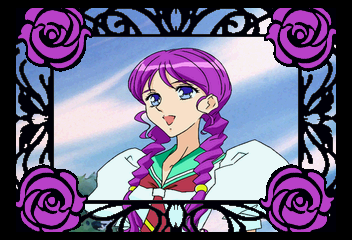
Yep, this is our main character. God help us
The Utena Saturn game, which was translated in 2015 courtesy of an ohtori.nu user, tries its hardest to integrate itself into the show, pulling artwork, voice actors, soundtrack, and even some FMVs straight out of the series. As such, it feels like a pretty low-budget affair, but I wasn’t expecting anything too glamorous from a tie-in like this. Plotwise, it takes place somewhere towards the end of the show’s first arc, which in practice means that the characters are underdeveloped and less interesting than they could have been (and Nanami is practically a no-show). The plot plays out like a test-run for the Black Rose Arc, with characters gradually getting bent to the villain’s will as the protagonist is left in the dark.
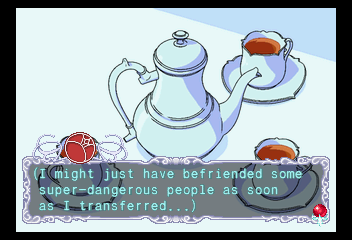
What a coincidence, I put poison in your tea
We find ourselves playing as a personality-free transplant to Ohtori Academy who quickly gets swept under Utena’s wing. As far as yuri-pandering goes, it’s both liberal by Utena show standards and not much at all. As a female student, you can ask the women of the show if they have girlfriends, but you’ll pretty much always get laughed off and chastised for it. I guess that’s true to form for Akio’s academy? Anyways, the character of note here is Chigusa, the other new transfer student. First and foremost, she’s the goth dream girl that the show never quite got, and when she does the same “I get told I look like a boy” bit as Utena, it’s even funnier this time around, considering she’s wearing a dress with a lace-up front. Chigusa is obviously the going to draw the player’s attention the most, because she’s new and mysterious. And the game slaps you on the wrist for that! You see, Chigusa is straight-up evil, and doesn’t even make an attempt to hide it. She starts off by whispering you the wrong answer in math class, but by day three she is straight-up trying to assassinate your character, from tacks in a cake to kicking your lungs out during a soccer match to a poisoning attempt. Unfortunately, if you like Revolutionary Girl Utena, chances are you are a lesbian and thusly like horrible women doing terrible things. Getting any positive relationship points with her will subtract points from everyone else, pretty much sealing your fate if you interact with her more than once.
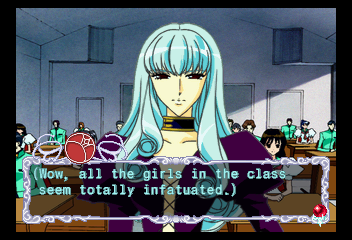
So you’ve sacrificed everything for Chigusa and all of the Student Council is effectively dead. Surely you’ll at least get some special bad ending, right? Maybe even a little bit of homoeroticism, as a treat.

Your reward is an incredibly brief scene in which your character trips down the dark therapy elevator, confesses that she has no real friends, and is dispatched unceremoniously by Utena in a Black Rose duel.

What a cruel game!
Playing through the game trying to get a real ending unfortunately doesn’t make our villain any more compelling. Like Professor Nemuro, Chigusa is a ghost from the past, a duelist who only wants to use the power of Dios to… travel back in time, steal your dad from your mom, and paradox you out of existence? It’s not even a half-baked ideology like the Student Council members have, it’s just a shitty scheme.
We do get an FMV duel between Chigusa and Utena, but it’s almost entirely made out of recycled frames from past duels, which makes sense given this game’s shoestring budget.
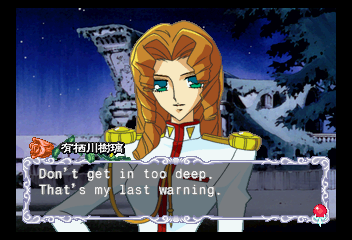
Me at myself before spending an entire evening trying to get my emulation setup to work since this is a two-disc game and that makes it extra finicky
My final thoughts on this game concern everyone’s favorite miracle-iconoclast. I’m a lesbian first and a gamer second, so obviously I picked the Juri route over the rest of the Student Council. It’s mostly standard fare, with her being initially cold, later incredibly distressed at how you admire her and Utena for being Duelists, and finally trusting you enough to let her in on the whole locket mess. Shiori doesn’t actually appear in the game, so Chigusa has to play her part in instigating drama, even making a pass at Juri and stealing her locket (As an aside, Kozue is here, exclusively to have a gay relationship with Chigusa to piss off Miki).
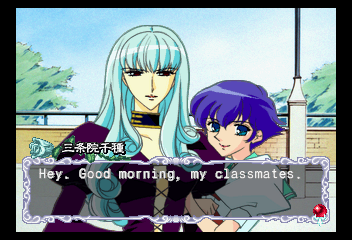
“How do you do, fellow lesbians”
It’s the ending of Juri’s route that really eats away at me. Unsurprisingly, your character catches feelings and doesn’t know how to process being in love with another girl, and Juri pretty much just laughs her off. But as your character prepares to leave the academy for good, Juri kisses her goodbye and hands you a locket with her own face in it.

You don’t have to be an expert in Juri’s arc to know that that’s one of the cruelest gifts she could have given to a fellow repressed lesbian.
Undyne tries to be a good lab partner to Alphys but then Frisk shows up with some newfound skills 🐟🦖 Made with Blender!
| Music: [Track 1] [Track 2] | Watch on Youtube |
the mental image of Swansea hugging a crying Anya bc his dadttitude calls for it and Daisuke sees his friend upset and gently hugs her from behind. So she's in this gentle group hug of love and support while Curly and Jimmy are in the other room fuckin. Idk. Stabbing each other or some shit .


a very touching moment of how it should have been!!!!!! vs whatever the fuck these two have wrong with them





Recent sketchbook pages!
-
 maidenxxbeloved liked this · 1 day ago
maidenxxbeloved liked this · 1 day ago -
 quacksalot liked this · 1 day ago
quacksalot liked this · 1 day ago -
 bebekalord liked this · 2 days ago
bebekalord liked this · 2 days ago -
 chaoscoffeehound liked this · 2 days ago
chaoscoffeehound liked this · 2 days ago -
 buttermilkpancakesstuff liked this · 2 days ago
buttermilkpancakesstuff liked this · 2 days ago -
 a-blue-goblin liked this · 2 days ago
a-blue-goblin liked this · 2 days ago -
 radio-host-jai liked this · 2 days ago
radio-host-jai liked this · 2 days ago -
 imsleey liked this · 2 days ago
imsleey liked this · 2 days ago -
 astudyinfreewill liked this · 2 days ago
astudyinfreewill liked this · 2 days ago -
 dlsintegration reblogged this · 2 days ago
dlsintegration reblogged this · 2 days ago -
 dlsintegration liked this · 2 days ago
dlsintegration liked this · 2 days ago -
 v4mpgrrl reblogged this · 2 days ago
v4mpgrrl reblogged this · 2 days ago -
 giasfelfebrehber21 reblogged this · 2 days ago
giasfelfebrehber21 reblogged this · 2 days ago -
 pinkthinkspalistineshouldbefree liked this · 2 days ago
pinkthinkspalistineshouldbefree liked this · 2 days ago -
 pinkthinkspalistineshouldbefree reblogged this · 2 days ago
pinkthinkspalistineshouldbefree reblogged this · 2 days ago -
 runaway356 liked this · 2 days ago
runaway356 liked this · 2 days ago -
 vessel23x liked this · 2 days ago
vessel23x liked this · 2 days ago -
 corvid007 reblogged this · 2 days ago
corvid007 reblogged this · 2 days ago -
 corvid007 liked this · 2 days ago
corvid007 liked this · 2 days ago -
 unv3ra liked this · 2 days ago
unv3ra liked this · 2 days ago -
 dramaticbiatch liked this · 2 days ago
dramaticbiatch liked this · 2 days ago -
 tiny-space-platypus liked this · 3 days ago
tiny-space-platypus liked this · 3 days ago -
 mettywiththenotes liked this · 3 days ago
mettywiththenotes liked this · 3 days ago -
 yourdanishsw33theart liked this · 3 days ago
yourdanishsw33theart liked this · 3 days ago -
 cardboxshelter reblogged this · 3 days ago
cardboxshelter reblogged this · 3 days ago -
 cardboxshelter liked this · 3 days ago
cardboxshelter liked this · 3 days ago -
 cytoskeletonn reblogged this · 3 days ago
cytoskeletonn reblogged this · 3 days ago -
 awan-ungu reblogged this · 3 days ago
awan-ungu reblogged this · 3 days ago -
 sashimi55 liked this · 3 days ago
sashimi55 liked this · 3 days ago -
 imfandomtrashokay liked this · 3 days ago
imfandomtrashokay liked this · 3 days ago -
 cytoskeletonn liked this · 3 days ago
cytoskeletonn liked this · 3 days ago -
 aivr3524 liked this · 3 days ago
aivr3524 liked this · 3 days ago -
 tavathan liked this · 3 days ago
tavathan liked this · 3 days ago -
 unadulteratedstarlight0 liked this · 3 days ago
unadulteratedstarlight0 liked this · 3 days ago -
 honey-bunnysaurus reblogged this · 3 days ago
honey-bunnysaurus reblogged this · 3 days ago -
 salpal762 reblogged this · 3 days ago
salpal762 reblogged this · 3 days ago -
 salpal762 liked this · 3 days ago
salpal762 liked this · 3 days ago -
 mrsl005 liked this · 3 days ago
mrsl005 liked this · 3 days ago -
 hel-10-s reblogged this · 3 days ago
hel-10-s reblogged this · 3 days ago -
 steampunker134 liked this · 3 days ago
steampunker134 liked this · 3 days ago -
 silly-slacker-person liked this · 3 days ago
silly-slacker-person liked this · 3 days ago -
 drburgersauce reblogged this · 3 days ago
drburgersauce reblogged this · 3 days ago -
 rankaroid liked this · 3 days ago
rankaroid liked this · 3 days ago -
 sadghoststuff liked this · 3 days ago
sadghoststuff liked this · 3 days ago -
 quailgirlpeep liked this · 3 days ago
quailgirlpeep liked this · 3 days ago -
 brothersgrimmsnarl liked this · 3 days ago
brothersgrimmsnarl liked this · 3 days ago -
 sarues reblogged this · 3 days ago
sarues reblogged this · 3 days ago -
 sarues liked this · 3 days ago
sarues liked this · 3 days ago -
 dirteater25 liked this · 3 days ago
dirteater25 liked this · 3 days ago

I was gonna make this obnoxiously long but Tumblr didn;t let me :(
135 posts